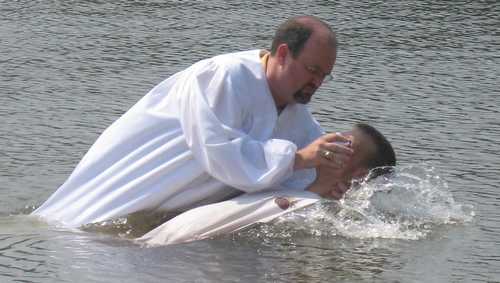                   |
 Image Credit: https://significantpractice-baptism.weebly.com/types-of-baptism.html Does John 3:5 Teach the Necessity of Water Baptism for Entrance into the Kingdom of God? What is the teaching of Roman
Catholicism? Paragraph
1257 in The
Sacrament of Baptism states that Christ taught us that
baptism is necessary for salvation. The Scripture cited is John 3:5. Paragraph
1215 reads, "This sacrament is also called "the
washing of regeneration and renewal by the Holy Spirit," for it
signifies and actually brings about the birth of water and the Spirit
without which no one "can enter the kingdom of God." The Scriptures
cited are Titus 3:5 and John 3:5
What is the position of WordExplain? In the first place, it is only on the basis of church teaching presumed to be true by the Roman Catholic Church that permits the church to assert that "water" (húdōr, 5204) in John 3:5 means "baptism." But the word "baptize" (baptídzō, 907) or "baptism" (báptisma, 908) is never used in John 3:5. The context alone can determine the meaning of Jesus' statement. Let us examine the context. (1) Nicodemus was a Pharisee genuinely interested in Jesus' identity. He had correctly concluded that Jesus was a teacher come from God. Jesus' miracles (signs, sêmeíon, 4592) proved that to Nicodemus (John 3:1-2). But Nicodemus did not yet exercise faith in Jesus as the Jewish Messiah, which was the whole point of His miraculous signs (John 20:30-31). And until Nicodemus did so, he had no hope of entering into or even seeing the kingdom of God which John the Baptist and Jesus had been promising the people of Israel (John 3:3, 5; cf. Matt. 3:2; 4:17, 23). (2) Jesus responded right to the point: Unless one is born again he cannot see the kingdom of God (John 3:3). "Born again" translates gennáō (1080) ánōthen (509). The second word can mean either "from above" (Matt. 27:51) or "again, anew" (Gal. 4:9). Nicodemus took Jesus to imply the second meaning (John 3:4). Which of the two did Jesus mean? I happen to believe He meant both nuances. He certainly answered Nicodemus on the level that he had responded. (3) Nicodemus was incredulous. Surely Jesus didn't mean that a man could enter a second time into his mother's womb and be reborn, did He? That would be impossible (John 3:4)! (4) Then Jesus answered Nicodemus' question on the level he had asked it. He responded, "Truly, truly, I say to you, unless one is born of water and the Spirit he cannot enter into the kingdom of God" (John 3:5). I do not think for a moment, that when Jesus spoke of being "born of water," he had water baptism in mind. That is completely foreign to the context. Rather, when Jesus spoke of being "born of water," he was talking about the original birth of a human. We all know that babies are enveloped in amniotic fluid throughout their growth in the womb. A sure sign that a pregnant woman is ready to give birth is "when her water breaks." That is all Jesus meant here. To insert "baptism" here is a clear case of eisegesis based on dogmatically held doctrinal beliefs. What Jesus was saying was that an individual must be born of natural birth first, but that is not enough. He must also be born a second time and/or born from above – born of the Spirit. If he is not born of the Spirit he cannot enter the kingdom of God (John 3:5). (5) Jesus was not through. He continued, "That which is born of the flesh is flesh." If you are born of water, born the first time, you are merely born of flesh, and you remain flesh. "....and that which is born of the Spirit is spirit" (John 3:6). If you are going to enter the Kingdom of God, which has a spiritual basis, you must be born a second time by means of the Spirit of God. So John 3:6 confirms the interpretation of John 3:5. If you are merely born the first time (born of water), you remain in the realm of the flesh. If you want to participate in the spiritual kingdom of God, you must be born a second time by means of the Holy Spirit. (6) Jesus was not really saying anything new (John 3:9-12); He was just saying it in a different way. The Messiah Himself would be Spirit-filled (Isa. 11:2; 42:1; 61:1), and the time was coming when God would pour out His Spirit upon the Israeli people (Isa. 44:3; 59:20-21; Ezek. 36:26-27; 37:14; 39:29; Zech. 12:10), and ultimately upon all flesh (Joel 2:28-29). (7) In John 3:13-18 Jesus pointed out very clearly how one is born into the Kingdom of God. If one places his trust in the Son of Man, the Messiah, and thus the Son of God, he will have everlasting life! A great many people hate the Light and shun it (John 3:19-20), but those who practice the truth come to the Light (John 3:21). This is consistent with John's introductory statements that the Light was in the world, and that the One who had created the World came to His own things, but His own people did not receive Him (John 1:1-11). But as many as received Him, to them He gave the right to become children of God, even to those who believe in His name" (John 1:12). Concerning those who receive Jesus, who believe in His name, the Apostle asserted, "who were born, not of blood, nor of the will of the flesh nor of the will of man, but of God" (John 1:13). In other words, they were "born again" or "born from above" – take your pick. Conclusion: Roman Catholics (and a number of Protestant denominations) are unjustified in using John 3:3, 5 as a justification for baptismal regeneration. The context will not permit it. |
|
